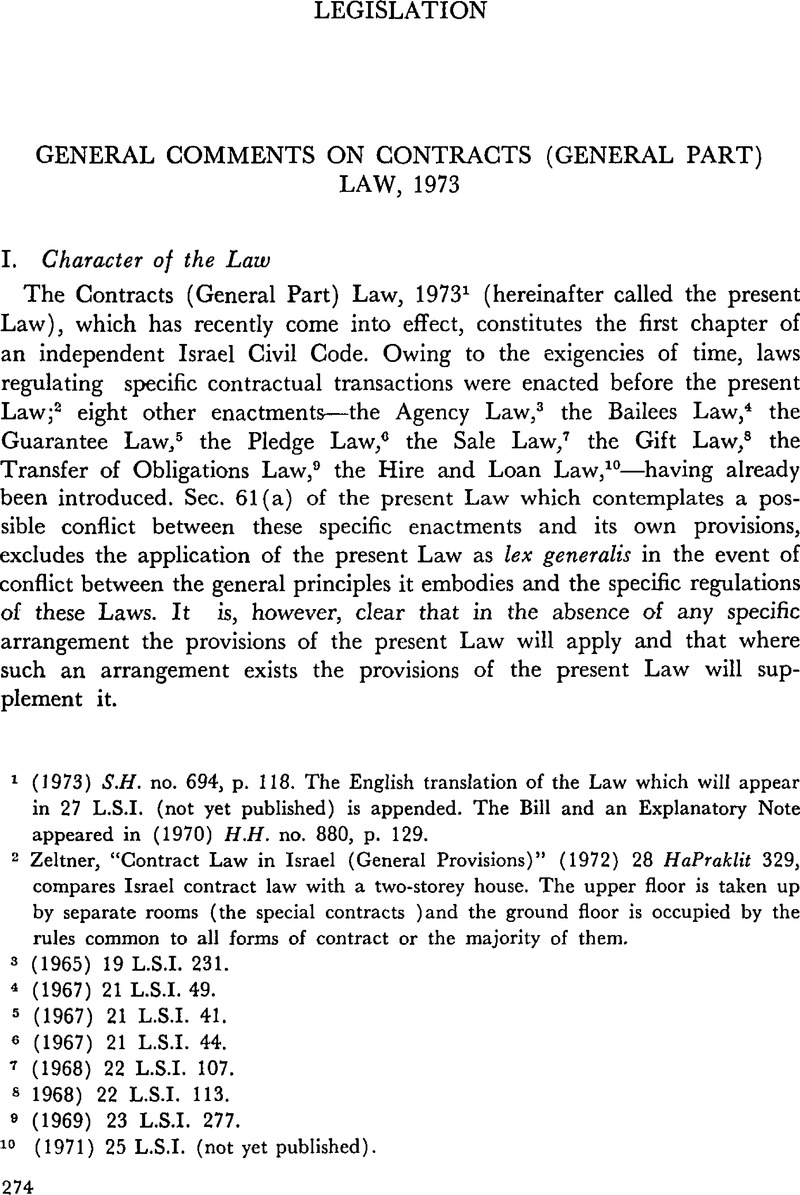Published online by Cambridge University Press: 12 February 2016

1 (1973) S.H. no. 694, p. 118. The English translation of the Law which will appear in 27 L.S.I, (not yet published) is appended. The Bill and an Explanatory Note appeared in (1970) H.H. no. 880, p. 129.
2 Zeltner, , “Contract Law in Israel (General Provisions)” (1972) 28 HaPraklit 329Google Scholar, compares Israel contract law with a two-storey house. The upper floor is taken up by separate rooms (the special contracts) and the ground floor is occupied by the rules common to all forms of contract or the majority of them.
3 (1965) 19 L.S.I. 231.
4 (1967) 21 L.S.I. 49.
5 (1967) 21 L.S.I. 41.
6 (1967) 21 L.S.I. 44.
7 (1968) 22 L.S.I. 107.
8 (1968) 22 L.S.I. 113.
9 (1969) 23 L.S.I. 277.
10 (1971) 25 L.S.I, (not yet published).
11 (1965) 19 L.S.I. 58.
12 (1969) 23 L.S.I. 575.
13 Apparently under the influence of Professor Tedeschi who acted as chairman of the advisory committee.
14 The notion of “resolve” mentioned in secs. 2 and 5, which is patently taken from Jewish law.
15 Such as recognition of third party rights in Chapter IV.
16 Explanatory Notes to the Bill of the present Law.
17 Chapter VI.
18 Secs. 49 and 50.
19 Sec. 53.
20 Tedeschi, , “Contracts (General Part) Bill, 1970, and its Boundaries” (1971) Mishpatim 105.Google Scholar
21 Ibid. at p. 109.
22 Cf. Abramson, , “Contradiction of Documents” (1970) 2 Mishpatim 120.Google Scholar
23 16 L.S.I. 106.
24 18 L.S.I. 51
25 25 L.S.I, (not yet published). See (1973) 8 Is.L.R. 135.
26 It should be noted that the Contracts (Remedies for Breach of Contract) Law does not deal with impossibility prior to the contract being made, nor has the subject any specific place in the present Law. (In English law it is treated under common mistake). Now that the “natural” way has been reopened in Israel for filling in omissions in the law, i.e., inference by analogy (See Barak, , “The Codification of Civil Law” (1973) 3 Iyunei Mishpat 5Google Scholar) it will conceivably be possible to regulate cases of initial impossibility. But then the question will be to determine the rule from which inference should be drawn: either sec. 18 of the above-mentioned Law, dealing with impossibility created after the contract has been made, or sec. 14 of the present Law, regulating mistake.
27 The Explanatory Notes to the Bill explicitly refer to the matter.
28 Sec. 2 (resolve of the offeror) and sec. 5 (resolve of the offeree).
29 Halavi v. Mifal HaPayis, (1973) (I) 27 P.D. 38.
30 Ibid. at p. 45.
31 Sale Law, 1968, sec. 6; Hire and Loan Law, 1971, sec. 4. See also Bill of the Labour Contract Law, 1968, sec. 3.
32 Articles 242 B.G.B.; art. 1134 of the French Code Civil. See also U.S.C. sec. 1.203.
33 It exists, however, in a number of specific provisions employing a series of concepts similar thereto or identical therewith: the test of the reasonable person in its various applications in the interpretation of contracts and implied conditions; misrepresentation; duress; undue influence; equitable estoppel; contracts uberrimae fidei.
34 Sec. 15 (deceit) and sec. 18 (extortion).
35 Jhering, , “Culpa in Contrahendo” Jahrbucher fur die Dogmatik (Jena, 1861) vol. 4, ss. 16 ff.Google Scholar
36 But the existence of sec. 12(b) makes it unnecessary to call in aid breach of statutory duty (sec. 63 of the Civil Wrongs Ordinance [New Version], 1968).
37 The word “or” in sec. 12(b)—“A person who does not act in customary manner and in good faith shall be liable…for the damage caused…by the negotiations or the making of the contract”—suggests a broad interpretation of sub-sec. 12(a) so as to include the making of a contract. The matter becomes even more important in connection with the control of exemption clauses (wherever the Standard Contracts Law does not apply). The novelty of sub-sec. 12(a) is usually regarded as arising where the contract has not yet been made. Jhering holds that the obligation is upon the person at fault during negotiations in rendering the contract a nullity or worthless or impossible of performance.
Sub-sec. 12(a) may, however, be extended to apply also after the contract has already been made. The contractual relationship then extends beyond the contract and to the period before it was made (here again the word “or” is of assistance). Sub-sec. 12(a), if interpreted to include the stage at which the contract is made, can properly serve as a foundation for judicial control of exemption clauses.
38 The word “contents” was added in the Knesset and thus extended the provisions of sec. 30 as against sec. 31 of the Bill. Speaking of differences, it may be asked whether sec. 30 also applies to contractual terms, particularly in view of the fact that the present Law omits a provision in the Bill that every reference therein to a contract includes any term of a contract.
39 Per Cohn J. in The State of Israel v. Hednah (1960) 14 P.D. 326; per Berinson J. in Halavi v. Mifal HaPayis, supra n. 29.
40 By virtue of custom recognized by article 45 of the Mejelle as a source of law, or by virtue of the principles of the Common law.
41 Statutorily, under the Motor Vehicle Insurance (Third Party Risks) Ordinance, 1947.
42 Sec. 34 is clearly concerned with “an obligation … in favour of a person who is not a party to the contract” in contrast to an obligation towards him which would turn him into a contractual party.
page 283 note 1 25 L.S.I. 11.
page 285 note 2 [New Version] L.S.I. 5
page 291 note 3 Drayton, , Laws of Palestine III, p. 2569.Google Scholar